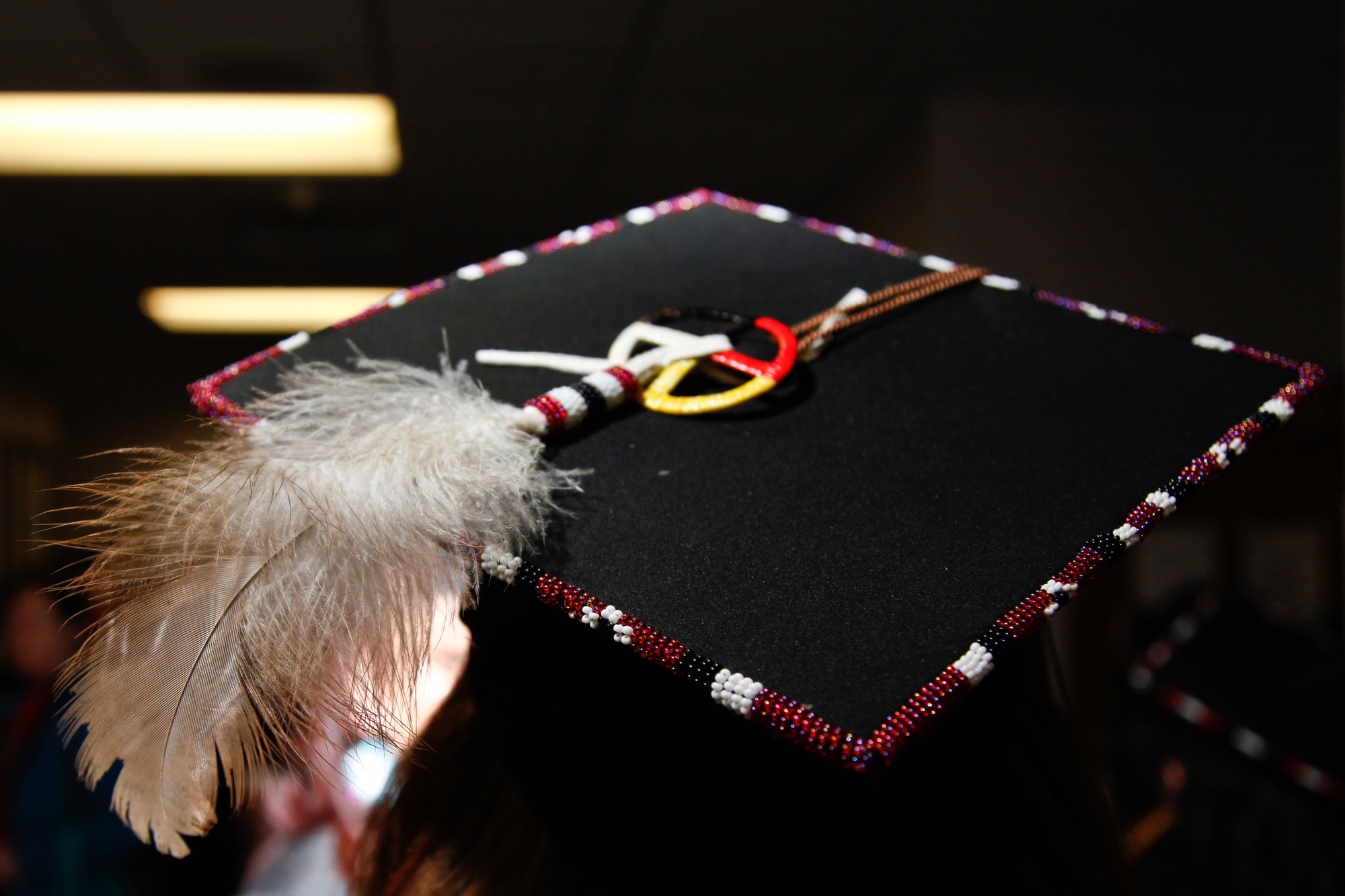As members of the National Native Scholarships Providers (NNSP), we believe school should be a place where young people feel free to learn, grow, and excel—while being true to their identities. Unfortunately, that is not always the case, and many young Indigenous people approach graduation with apprehension. Many graduates across the country decorate their graduation gowns and mortarboards to celebrate the occasion, yet some school boards, policymakers, and elected officials discriminate when Indigenous students choose to wear Native regalia, which is a spiritual and cultural tradition relating to their tribal identities.
Just this week in Oklahoma, Governor Kevin Stitt vetoed Senate Bill 429, which passed the Oklahoma legislature April 24 with a vote of 90 to 1. Its passage would have ensured Native students in all Oklahoma public schools would be permitted to wear tribal regalia at high school graduations and other ceremonies throughout the state.
The governor stated in his veto message, “Should this bill become law, the proverbial Pandora’s box will be opened for other groups to go over the heads of local superintendents and demand special favor to wear whatever they please at a formal ceremony.” He added the decision to allow students to wear traditional items such as eagle feathers or regalia rests with local school districts and not the state government.
Oklahoma lawmakers intended the bill would clarify Indigenous students’ rights for public school administrators, helping officials to avoid violating students’ rights and thereby inflicting traumatic discrimination during what should be a joyous occasion in Native students’ lives that is shared by their families and communities.
At public institutions, the right of an individual to wear regalia is protected by the First Amendment of the U.S. Constitution. Federal constitutional law requires that any law attempting to limit the guarantees of a fundamental right—in this case a First Amendment right—must be necessary to promote a compelling self-interest and must be as narrowly tailored as possible to meet that interest.
When the governor vetoed a bill that is specific to regalia because “other groups” might wear clothing that pleases them, the governor was diverting attention from the real issue at hand—Native students’ fundamental right to wear clothing and items specific to their spiritual beliefs and practices. Tribal regalia is no mere decoration or “fashion.” When an Indigenous person wears regalia, the practice is tied to sincerely held spiritual beliefs and traditions of their tribes, and the practice is arguably protected by the First Amendment. Not incidentally, government officials not long ago tried to eradicate the practice and these beliefs and traditions through assimilation and legal prohibition.
In a news report, Choctaw Nation of Oklahoma Chief Gary Batton issued the following statement regarding Stitt’s veto of SB 429. “This bill, which would have allowed all Native American students in Oklahoma to wear tribal regalia at school ceremonies, is not controversial. It allows the students to honor their native culture and traditions. In fact, only one member of the Legislature voted against it…This is a popular, common-sense measure with no costs for the state or schools. We hope the House and the Senate will quickly override the veto to provide more freedom for Oklahoma students who want to honor their heritage.”
“With this legislation, Governor Stitt had an opportunity to support religious freedom and families honoring their kids’ high school accomplishments,” Chuck Hoskin Jr., Principal Chief of the Cherokee Nation of Oklahoma, told Native News Online. “Instead, he’s chosen more division and insults to his Native American constituents.”
States like Colorado are also considering guaranteeing students the right to wear and display their regalia at graduation. In Denver, Senate Bill 202 is headed to Governor Jared Polis for consideration and signing.
As founding organizational members of the NNSP, every year we see incidents in which school administrators deny Indigenous students the opportunity to wear their regalia at graduation ceremonies and to celebrate their achievement in a culturally meaningful way. These acts retraumatize students (and their families) who have had to deal with marginalization and erasure in education institutions for years—students who have worked hard to get to a place that is worth celebrating.
We believe narrow, discriminatory, and arbitrary regulations concerning protocol and dress codes when it comes to Native regalia at graduations demean Indigenous people and rob them of the opportunity to celebrate their identities. We urge students, their families, and Native allies nationwide to contact their elected officials, including their school boards, state legislatures, and governors, to ensure Native graduates can exercise their right to wear their tribal regalia proudly as they walk across the stage to receive the diploma that they worked so hard to achieve.
Earning a diploma or a degree is a huge accomplishment. We call upon our schools and institutions such as our legislatures to celebrate the beauty, hard work, and worth of every individual that has earned a diploma or degree—by allowing Indigenous graduates to celebrate in a way that is meaningful and respectful to them and their cultures.
Four national Native scholarship providers comprise the NNSP: the American Indian College Fund (the College Fund), the American Indian Science and Engineering Society (AISES), the Cobell Scholarship Program administered by Indigenous Education, Inc., and Native Forward Scholars Fund.
To help students achieve favorable outcomes with requests to wear regalia at graduation, the American Indian College Fund published a guide for students to request wearing tribal regalia at graduation ceremonies.








